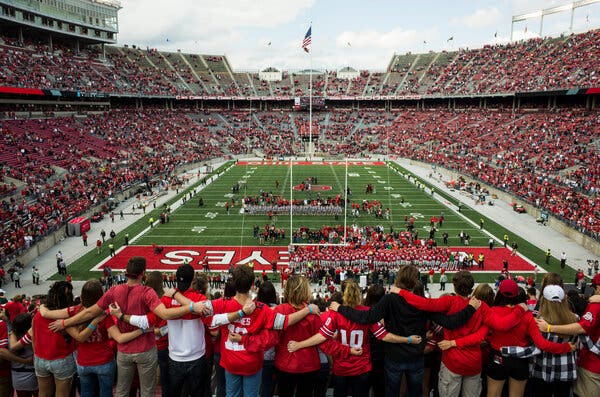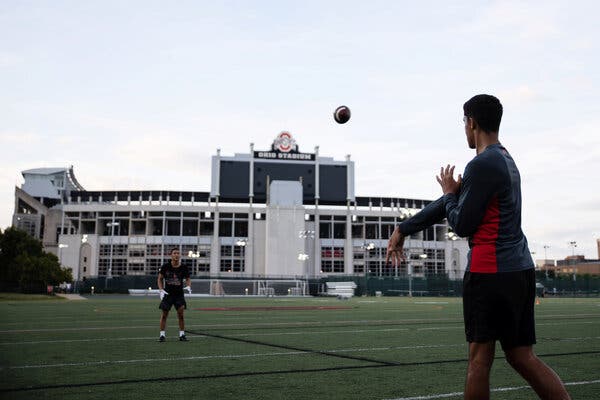Advertisement
The Big Ten Conference’s decision to cancel its football season reverberated across Ohio, where the Buckeyes’ football program looms large. Some voters blamed President Trump’s handling of the virus.

CENTER OF THE WORLD, Ohio — As he stood outside the Dollar General store, loading groceries into his pickup, Dennis Kuchta pondered what it will mean not to have an Ohio State football season this fall.
“The bars here will all take a real hit when there aren’t games on Saturdays,” said the 69-year-old retiree, whose son-in-law played on the offensive line for the Buckeyes. “It’s a huge loss, and I don’t think people realize that yet.”
The Big Ten Conference’s decision to cancel its football season reverberated this week across Ohio, where the Buckeyes’ football program looms larger than that of any of the state’s major league sports franchises. A pillar of autumn Saturdays will be missing, and Mr. Kuchta and others in this football-mad corner of the state were looking for someone to blame.
“Trump just blew it,” Mr. Kuchta said, alluding to President Trump’s mismanagement of the coronavirus pandemic. “He just didn’t handle it. He could have shut things down for five or six weeks and figured out what he was doing, but he never had a plan.”
For Mr. Trump, the cancellation of big-time college football in the Midwest and the West — the Pac-12 Conference also canceled its season Tuesday — serves as yet another unmistakable sign of how fundamentally the pandemic has transformed American life and cast a spotlight on his administration’s handling of the crisis. Critics point to South Korea, where fans have been attending professional baseball games for weeks, and to parts of Europe, where some soccer and tennis matches are open to spectators.
And like the closings of schools, bars, restaurants and churches, the loss of tailgating, jammed stadiums and marching bands felt as if yet another piece of fabric was being torn from American life.
In a hotly contested election year, the loss of college football seems almost certain to seep into politics as well. No conference covers as many presidential battleground states as does the Big Ten, the Midwestern behemoth with schools in seven states that are being fought for by both Joe Biden and Mr. Trump.
In crucial battleground states like Ohio, Michigan and Pennsylvania, where college football serves as an autumn religion not just on campus but in the rural areas where Mr. Trump’s support runs deepest, losing football may be a political stain that the president is unable to blame on his enemies in the Democratic Party or on the media.
“As great as politics is — it’s a sport that so many people enjoy watching — it’s not as important as college football in Ohio, in Georgia, in Alabama,” said Paul Finebaum, who hosts a nationally syndicated college football radio show for ESPN. “And without it, people will be lost and people will be angry. There are layers of blame to go around, and in the end, this transcends sports.”

Mr. Finebaum predicted that the loss of the college football season would damage Mr. Trump even among his most faithful supporters.
“I’ve always tried desperately to keep politics out of our program, and this summer I’ve failed miserably,” he said. “We don’t have a day that doesn’t pass where someone doesn’t call up and blame the president. Even from the South, I’ve heard more anger directed at the president than I thought.”
The ties between college football and Mr. Trump have long been deeper than the ones he has with other major sports, excluding golf. He famously served the Clemson Tigers football team a $5,500 fast-food feast to celebrate its national championship, and has attended multiple college football championship games.
The feeling has been mutual. Some college football luminaries have expressed their support for the president, and Hall of Fame coaches including Lou Holtz and Bobby Bowden campaigned for Mr. Trump in 2016.
As word of decisions to cancel the fall football season began to leak this week, Mr. Trump and his top Republican allies began a pressure campaign aimed at keeping the sport in business. Both Mr. Trump and Vice President Mike Pence tweeted admonitions that college games should be played, using the #wewanttoplay hashtag employed in recent days by a loose confederation of players.
“Hopefully we can watch colleges play football. We want to get football in colleges,” Mr. Trump said during his Tuesday afternoon White House news conference, hours after the Big Ten announced its decision not to play. “College football, get out there and play football. People want to see it.”
Other Republican candidates are pushing a similar message. Tommy Tuberville, the former head coach at Auburn University who won the Alabama Republican Senate nomination with vigorous backing from Mr. Trump, released a video on Monday calling for university presidents to relent and allow the season to begin.
“College football is the lifeblood of the South, and allowing teams to play this season will bring a much needed sense of calm to these strange times,” Mr. Tuberville said. “I support the players who want to take the field this season and I hope you will join me. Let them play.”
Mr. Holtz, a former coach at Notre Dame and other colleges, who grew up in northeast Ohio and played football at Kent State University, said during an appearance on Fox News that football players should assume pandemic risks as if they were fighting in a war.
“When they stormed Normandy, they knew there were going to be casualties — there were going to be risks,” Mr. Holtz said. “Young people, they think it’s like cancer. They think they’re going to die.”
For years, the college football season has been an enticing advertising canvas for both parties, recently dominated by Republicans. In the 2018 midterms, Republican candidates spent $6.5 million on ads during college football games, while Democrats spent about $4.1 million, according to Advertising Analytics.
Mr. Trump, who is enthralled with advertising during live sporting events in part because of their high ratings, spent roughly $1.3 million on ads during college football games in his 2016 campaign.
The overall audience of college football skews Republican. A study from Columbia University in 2012 found that college football fans skewed as heavily Republican as NASCAR fans.
It’s far from clear how much support, if any, Mr. Trump might lose because of the absence of college football.
Chris Spielman, an All-American linebacker at Ohio State who is now a television analyst for N.F.L. games on Fox, said fandom in Ohio cuts far across party lines.
“There are people on both sides of it,” he said. “There are Democrats who want football and there are Republicans saying we better shut it down even more.”
But Danny O’Connor, the Franklin County recorder who in 2018 campaigned for Congress in the Columbus suburbs wearing an Ohio State polo shirt, saw things differently. He predicted before the season’s cancellation that Ohio State’s Buckeyes would finish the year undefeated.
Losing the season means that Mr. Biden will carry the state “because that will be one person’s fault: Donald Trump,” Mr. O’Connor said. Mr. Trump won Ohio by 9 percentage points in 2016.
Patrick Murray, a Monmouth University pollster who has surveyed several presidential battleground states this year, said losing the football season could play a role in pushing Republican voters away from Mr. Trump this fall. He cited in particular the sliver of voters who had not yet made up their minds, and who were growing increasingly unwilling to accept all the disruptions caused by the failure to contain the coronavirus.
“It’s just one of those markers that reminds people of how much has been disrupted in their life,” Mr. Murray said.
Representative Anthony Gonzalez, an Ohio Republican who was a first-round N.F.L. draft pick after playing wide receiver at Ohio State, said college football players were likely to be safer from the coronavirus under the watch of their coaches than they would be at their homes away from campuses.
He predicted Ohio State fans in his northern Ohio district would blame university administrators and not Mr. Trump for losing the season. By calling for the season to take place, Mr. Trump is channeling not just his political base but a vast majority of voters, Mr. Gonzalez said.
“I can say, in my district, I think overwhelmingly people would support the statements that he made, and even people who aren’t supporters of his,” Mr. Gonzalez said. “If we polled it, I think probably 75 to 80 percent of people would agree with that sentiment that they should play. I feel pretty strongly about that.”
Yet Senator Sherrod Brown, an Ohio Democrat who has two master’s degrees from Ohio State, disagreed, saying that Mr. Trump will not be able to explain to voters why he’s not responsible.
“Everything that happens in this pandemic is on his watch,” Mr. Brown said Tuesday. “The unemployment’s on his watch, the canceled seasons are on his watch. I mean, all of this is on Trump’s watch, and he has so bungled this and he could point fingers and blame some elite somebody somewhere, but it’s on him.”
-
-
- At least three-quarters of Americans will be eligible to vote by mail in November. See the state-by-state breakdown of rules for absentee ballots.
-



